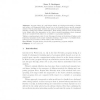2825 search results - page 45 / 565 » Support for Object-Oriented Testing |
134
click to vote
SOFTVIS
2010
ACM
15 years 2 months ago
2010
ACM
Object oriented software development is designed to be modular, with code reuse being very common. When bugs are introduced, they can manifest themselves in one or more sections o...
133
click to vote
JUCS
2007
15 years 2 months ago
2007
: Program slicing is a well known family of techniques intended to identify and isolate code fragments which depend on, or are depended upon, specific program entities. This is pa...
173
Voted
ICST
2010
IEEE
15 years 1 months ago
2010
IEEE
In the presence of an internal state, often it is required a sequence of function calls to test software. In fact, to cover a particular branch of the code, a sequence of previous...
135
click to vote
TOOLS
2000
IEEE
15 years 6 months ago
2000
IEEE
Some designers of class-based object oriented languages choose not to support multiple inheritance. As a result, programmers often resort to ad hoc workarounds. The most common of...
CSMR
2008
IEEE
15 years 9 months ago
2008
IEEE
Aspect Oriented Programming (AOP) has been proposed as a new programming paradigm. The originality in AOP is the aspect, a single modularization unit for all those functionalities...


